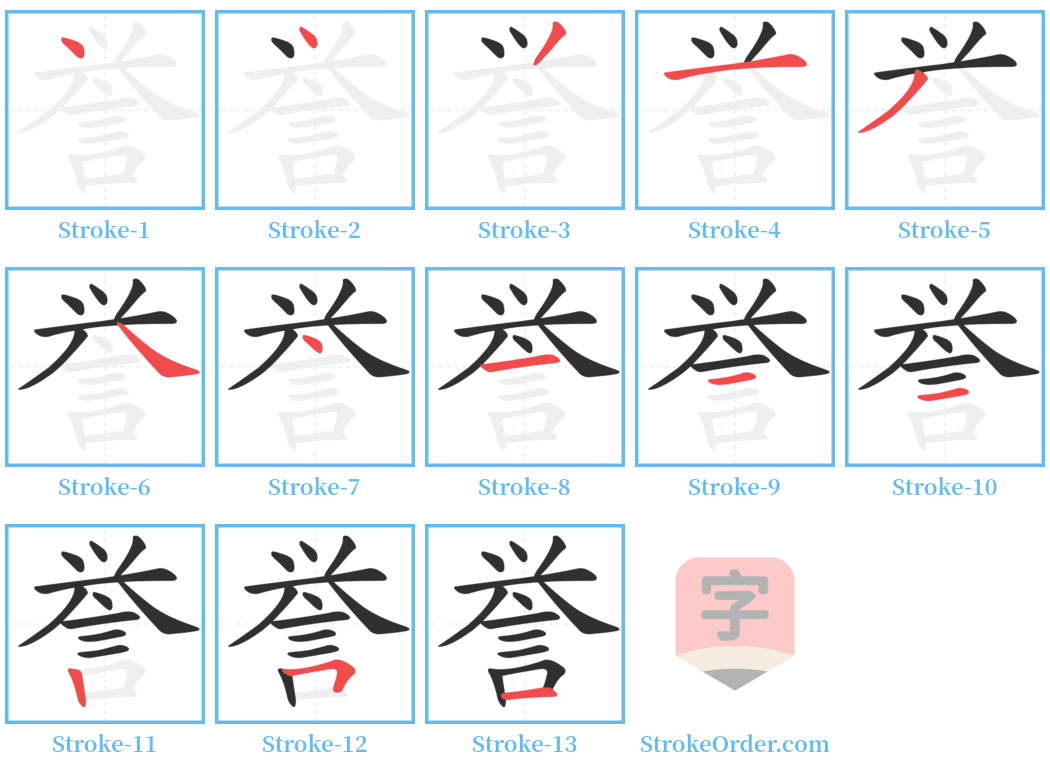誉 Stroke Order
Animated Stroke Order of 誉

Stroke Order Diagrams for 誉

Step-by-Step Handwriting Guide for 誉

Learn to Write Chinese Characters with Video Tutorials
Watch the video of writing the Chinese character "誉", learn the correct stroke order (笔顺) of the character "誉", and master the standard way of writing the character "誉".
Free Printable Handwriting Practice with Stroke Order: 誉
Printable Writing Practice Worksheet of "誉" in Portrait Orientation (Tian Zi Ge)

Printable Writing Practice Worksheet of "誉" in Landscape Orientation (Tian Zi Ge)

Information of 誉
Pinyin
yù
Radical
言
Strokes
13 strokes
Usage
★★★★★
Definition
reputation
誉
yù
1. 名声。
Fame; reputation.
2. 称扬,赞美。
Eulogize; praise.
3. 古同“豫”,欢乐。
(In ancient usage) same as “豫” (yù), happiness.
名声:荣誉。名声。信誉。沽名钓誉。
Fame: honor; well-known; credibility; seeking fame dishonestly.
称扬,赞美:毁誉。交口称誉。
Eulogize, praise: slander and praise; unanimously praise.
古同“豫”,欢乐。
(Ancient usage) same as “豫” (yù), happiness.
【本义】: 称赞,赞美
[Original meaning]: to praise; to applaud.
【造字法】: 形声。从言,舆 (yù)声。
[Character formation]: phonetic-ideographic; composed of “speech” and “sound”.
1. 同本义 ([En.] eulogize; praise)
Same as the original meaning.
2. 通“举” jǔ。推荐 ([En.] recommend)
Same as “举” (jǔ), to recommend.
【引】
1. 《说文》:誉,偁也。
"Shuō Wén": Yù means praise.
2. 《墨子经》:誉名美也。
"Mozi": Praise refers to a beautiful name.
3. 《周书·谥法》:状古述今曰誉。
"Zhou Shu": Describing the past and present refers to praise.
4. 《礼记·表记》:君子不以口誉人。
"Liji": A gentleman does not use his mouth to praise others.
5. 唐· 柳宗元《柳河东集》:佞誉诬谀。
Tang, Liu Zongyuan's "Liuhandongji": Flattery and deceit.
6. 唐· 韩愈《朱文公校昌黎先生集》:誉之则以为忧。
Tang, Han Yu's "Zhu Wengong's Commentary on Mr. Changli": To praise is to cause worry.
【例】
又如:誉人(称赞人);誉谀(歌颂阿谀);誉叹(赞叹)
For example: to praise someone; to eulogize flattery; to exclaim in admiration.
1. 通“举” jǔ。推荐 ([En.] recommend)
Same as “举” (jǔ), to recommend.
【引】
1. 《汉书·贾捐之传》:更相荐誉。
"Han Shu": They mutually praise each other.
2. 《汉书·匡衡传》:而列士不誉。
"Han Shu": Yet the scholars do not praise.
3. 《后汉书·宦者传论》:先时荐誉。
"Hou Han Shu": Previously recommended praise.
【名】
荣誉,美名 ([En.] fame; reputation)
Honor; good reputation.
【引】
1. 《诗·周颂·振鹭》:以永终誉。
"Shijing": To have eternal fame.
2. 《礼记·射义》:则燕则誉。 注:“言国安则有名誉。”
"Liji": If there is peace, there will be fame. Note: "When the country is at peace, there is reputation."
3. 《韩非子》:誉辅其赏,毁随其罚。
"Han Feizi": Praise assists rewards, slander follows punishment.
【例】
又如:誉望(名望)
For example: reputation.
1. 通“与” yǔ。同类 ([En.] kind)
Same as “与” (yǔ), kind.
【引】
1. 《管子·明法》:交众誉多。
"Guanzi": Many people praise each other.
2. 《荀子·议兵》:莫不亲誉。
"Xunzi": None does not appreciate praise.
3. 《荀子·臣道》:推类接誉。
"Xunzi": To promote similar kinds, thus connecting praise.
Input Method for 誉
Pinyin
yu4
Wubi
iwyf|igwy
Cangjie
fcymr
Zhengma
vdos
Four Corner
90601
Unicode
U+8a89
Same Pronunciation Characters